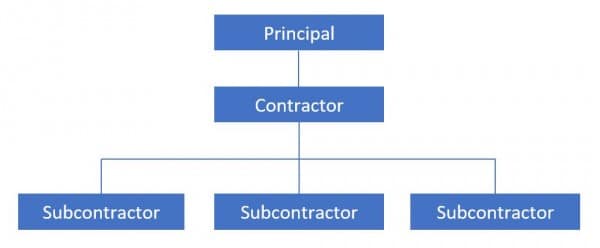Contents
The Building and Construction Industry (Security of Payment) Act 1999 (Security of Payment Act) created a system of payment requirements that principals, contractors and subcontractors must follow.
For the sake of context, it is important to understand what is meant by ‘Principal’, ‘Contractor’ and ‘Subcontractor’. It can be more easily explained in a diagram:
Using the example of a multi-storey residential complex:
- the Principal would likely be the proprietor of the land, or an agent of the proprietor, who wants to construct the building on the land and needs to engage a Contractor in the form of a building or construction company to get that work done.
- The Contractor is engaged by the Principal directly and it would ordinarily be a term of the agreement that the Contractor get the work done for a specific price, within a specific time and is responsible for engaging whatever trades are necessary to complete the project.
- The Subcontractor is engaged by the Contractor – he/she is likely a tradesman with specific expertise, like a plumber or an electrician, but also includes general labourers.
The Principal has no contractual obligations to any of the Subcontractors and this is usually intentional. The Principal just wants to work with one Contractor who will project-manage the build.
With projects like the example we have used above, the money all flows from the Principal. Once the Principal pays the Contractor, the Contractor can pay the Subcontractors.
But what happens if the Contractor doesn’t pay the Subcontractors? This is where the Security of Payment Act steps in.
If a Subcontractor is not paid by a Contractor, in the context of the type of relationship in the diagram above, the Subcontractor can apply to the Principal to stop payments to the Contractor until the Subcontractor is paid.
There is a very specific process that the Subcontractor must follow in order to affect payments in this way. However, if the process is followed successfully and the Contractor still fails to make payment to the Subcontractor, the Subcontractor can recover that money from the Principal out of money that would have been payable to the Contractor.
However, it is important to remember that the Security of Payment Act does not apply to building works to which the Home Building Act 1989 applies. Accordingly, the average residential building project does not benefit from this scheme.
We have experience in dealing with these types of claims. If you are unsure whether the work you are doing falls within the ambit of the Security of Payment Act, contact usand we can help you.




